The Roman Empire
| Roman Empire | Browse Topics | Alphabetical index | Site Map | Site News | Links |
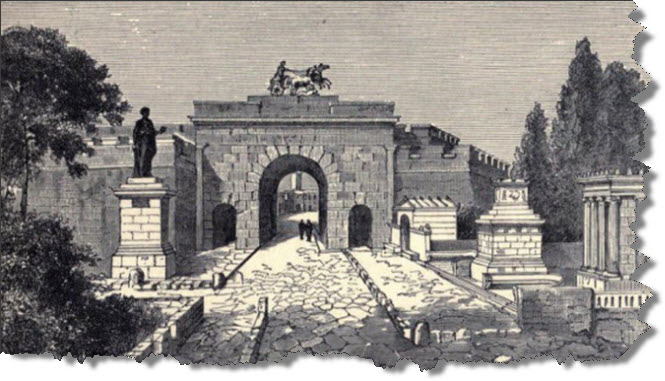 |
|||||
The Rise of the The Roman Empire
The The Roman Empire came into being at the conclusion of the civil war which followed the assassination of Julius Caesar; it lasted until the fall of Rome in 476 A.D.
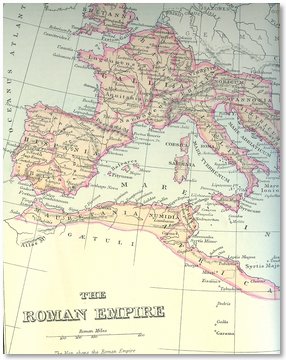
The Western Roman Empire |
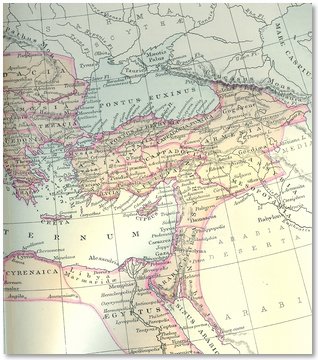
The Eastern Roman Empire. Click here for a larger map of the Roman Empire. |
Julius Caesar had been assassinated by members of a political faction who feared that Caesar would destroy the Republic and make himself Emperor. In their eyes, the assassination of Julius Caesar was necessary to preserve Roman political freedoms. Ironically, the assassination led to large scale civil war which destroyed the Roman Repblic and resulted in Augustus, the chosen heir of Julius Caesar, actually proclaiming himself Emperor.
Empire of Rome
Although an empire had been established, Augustus made no radical changes, but kept all the forms of the republic so as to maintain the illusion that the Republican institutions were being maintained. This course was necessary, since a radical assumption of power would have resulted in his deposition. However, he really exercised absolute sway and all the offices of trust were centered in him, including those of pro-consul, consul, censor, tribune, and high priest.
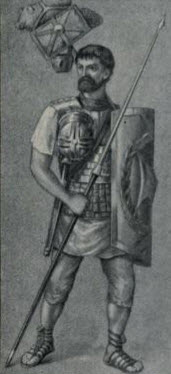
Roman Soldier
The roman empire at that time contained 120,000,000 inhabitants. It extended from the Euphrates on the east to the Atlantic on the west, and from the deserts of Africa on the south to the Danube and Rhine on the north. Fully 100 different nations were included in this vast dominion, each speaking its own language and worshiping its own gods. The size of the The Roman Empire was vast and far larger than most modern nations. Indeed many modern nations such as France, Spain, and Italy were merely provinces of what was then the The Roman Empire. It is remarkable that the Romans were able to rule such a vast area considering that it took many days or even months for messages to travel to Rome from the limits of the Empire. The reason for Roman success in maintaining their empire for so many centuries is due in part to their genius for building roads. The Romans had a saying -- all roads lead to Rome -- and indeed the Romans built hundreds of roads and highways throughout their empire, which allowed trade and communication to reach every province, and also permitted the swift deployment of the Roman legions. These roads were so well constructed that many Roman roads continued to be in use for centuries after the fall of Rome.
Battle Between Constantine and Maxentius for ownership of the Empire.
Constantine won and as a result the Empire eventually became a Christian nation.
The Age of Augustus was one of general peace and prosperity, and is often referred to as the Golden Age. It was not only the design of the emperor to maintain schools, extend literature, and effect internal improvements, but also to Romanize his subjects as a means of uniting the Empire into one political and cultural entity. This had already been accomplished in Gaul and was under way in Germany, but Arminius, a brave leader of the Germans, aroused his countrymen in opposition. In the year 9, A.D, Varus and his entire army in Germany met destruction, and Roman authority never was fully reestablished in the country of the Teutons. Although it was not realized at the time, the Roman's failure to hold on to their German provinces was to contribute to the collapse of the Empire centuries later. As a result of their expulsion from Germany, the Romans established a fortified frontier along the Rhine to protect its provinces in Gaul (now France). For a long time, the frontier held but as the Empire weakened it became more common for Germanic barbarians to raid Roman territory from their homes in Germany. One can only speculate whether the Empire would have lasted longer or even have been able to hold back the barbarian invasions of the 5th century if its frontier had been deeper in Germany or even Poland, so that the Empire woyld have been able to not only present a defence in depth against the invaders but recruit the Germans as loyal subjects and soldiers, since by then they would almost certainly have adopted Roman ways and customs.
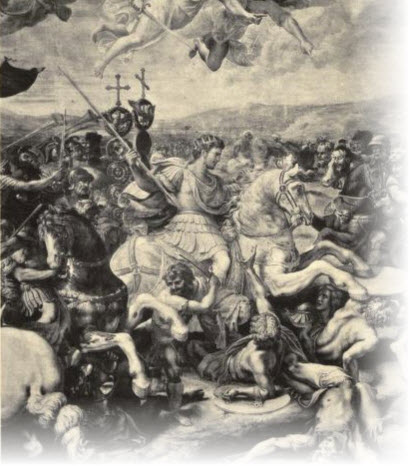
Battle Between Constantine and Maxentius for ownership of the Empire.
Constantine won and as a result the Empire eventually became a Christian nation.
The crucifixion of Christ at Jerusalem, under Pontius Pilate, then Roman procurator of Judaea occurred during the reign of the Emperor Augustus. On the death of Augustus, in 14 A. D., Tiberius, his stepson, became emperor by a decree of the senate.
Although the reign of Augustus had been effective and had led to the expansion and consolidation of Roman power and influence, several of the emperors that succeeded him were corrupt and inept. Some were completely insane. As a result, the The Roman Empire and its people suffered under the abuse of imperial power, and as the administration became less effective, the Empire became weaker and more vulnerable to invasion.
The emperors succeeding Tiberius were Caligula, in 37; Emperor Nero, in 54; Vespasian, in 69; and Domitian, in 81. Domitian was succeeded by the so called five "good emperors", Nerva, Trajan, Hadrian, Antonius Pius, and Marcus Aurelius, who reigned from 96 until 180 and gave Rome both peace and prosperity. Aurelius is regarded one of the most virtuous and wisest of earthly rulers, but the later years of his reign were disturbed by invasions of the Germans and the Slavs of Russia. He was succeeded by his son, Commodus, in 180, and from that time Rome began to decline.
The Decline of the Roman Empire
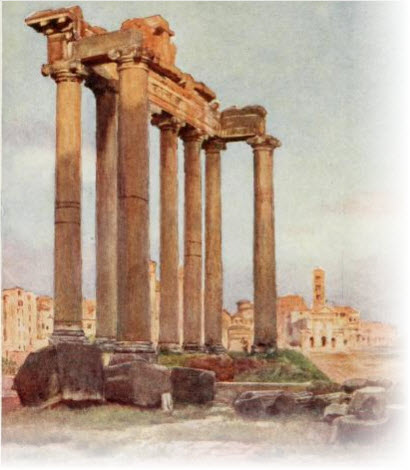
Roman Ruins
The decline of Roman power is due to many causes. It may be said that the most prolific were the rise of factional militarism, the continuous invasions by the Goths, Germans, and Persians, the concentration of wealth into the hands of a few, and a low state of political and moral aptitude. During the 1st century Christianity spread rapidly over the Western Empire and became a potent force in displacing the gods of the Romans. Though tolerant of all religious beliefs in every nation they conquered, the Romans persecuted the Christians. This was due to the fact that they refused to offer sacrifice to the gods of the empire, which during the later Empire included the Emperor himself. As a result, by refusing to worship the Emperor as a god, the Christians were seen as seditious and disloyal. The Christians absented themselves from the games and feasts and were accustomed to hold their meetings at night. Soon they came to be regarded enemies of the state and were persecuted by even the best rulers, as Trajan and Diocletian.
Another cause of the decline of the The Roman Empire is that it became increasingly reliant on foreign mercenaries from Germany, Gaul and the Balkans, rather than citizen soldiers. These mercenaries were not always reliable and often revolted and sometimes joined with invading barbarian tribes, to whom they were related, in overthrowing Roman power. As well, there was political instability as the army would often depose the reigning emperor and install one of its generals.
Constantine was declared emperor by his troops in 306 and, after overthrowing five rival contestants for the throne, he became sole ruler in 324. His reign marked an era in the history of the world, for the reason that he established Christianity as the state religion and removed the capital from Rome to Byzantium, a Greek city on the Bosporus, which was renamed Constantinople (modern Instanbul) in his honor. He made the government absolutely despotic by establishing a court of titled nobility and weakened the power of the army. While Christianity made it possible for the empire to resist three centuries of barbaric invasions, it did not supply enduring strength.
Julian the Apostate sought in vain to restore the old religion and Valens taxed every energy of the empire to repel the invading Goths, who pressed forward to the very gates of Constantinople, but he was captured and burned. Theodosius the Great for a few years stayed the division of the empire by enlisting 40,000 Goths under the eagles of Rome, but at his death, in 395, a division occurred between his two sons. The Eastern; or Byzantine Empire, passed to his son Arcadius and the Western Empire, to Honorius.
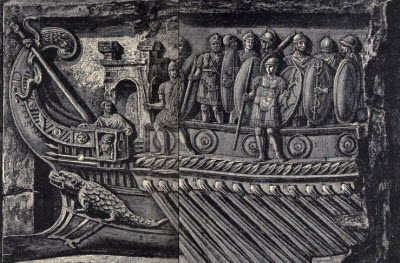
A Roman Warship
Continuous jealousies between the two empires greatly weakened both governments and, to save his dominion from ruin, Arcadius the Emperor of the Eastern part of the The Roman Empire, induced the invaders from the north to turn against Italy. The three great barbaric leaders were Alaric the Goth, Attila the Hun, and Genseric the Vandal.
Alaric captured Rome in 410, while Attila swept like a scourge across Italy and only spared Rome from utter destruction, in 451, at the entreaties of Pope Leo. Genseric secured control of the Mediterranean and sailed up the Tiber in 455. Pope Leo met Genseric to entreat that the city might be spared, but he turned it over to the warriors to be sacked. He carried 30,000 slaves and vast treasures from Rome to Carthage, where he had founded an empire on the site of the city destroyed by the Romans six centuries before. Rome was now at the mercy of Odoacer, a German chief, who commanded that Romulus Augustulus, the last Roman monarch, lay down his useless scepter. The emperor yielded in 476, and thus passed away the great The Roman Empire.
It is a curious incident in history that both the founder and the last sovereign of Rome bore the name of Romulus.
However the The Roman Empire did not actually end in 476 A.D., the eastern portion ruled by Byzantium continued until 1453 A.D. when it was captured by moslem invaders. The eastern half of the Empire is referred to by modern historians as the Byzantine Empire, but its people referred to themselves as Romans, and considered themselves the surviving portion of the The Roman Empire. In that sense the The Roman Empire can be said to have lasted an incredible 2200 years from the foundation of Rome to the fall of Constantinople. It must be admitted however that although the Byzantine Empire considered itself the continuation of the The Roman Empire, its people were primarily Greek and Greek rather than Latin was the predominant language.
After the fall of Italy and Rome to the barbarians, the Emperors of the East attempted to recover the lost Roman territories and succeeded in reconquering Italy and other areas. Rome was a province of the Byzantine Empire until 800, when Charlemagne received its crown, though its history had become merged into that of Italy some centuries before.
This video shows the expansion and eventual contraction of the the Roman Empire as it first conquered new lands, and then gave way to barbarian invasions:
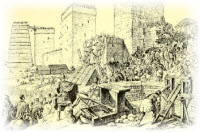
A Besieged City
| Privacy Policy | Site News | About | Site Map |